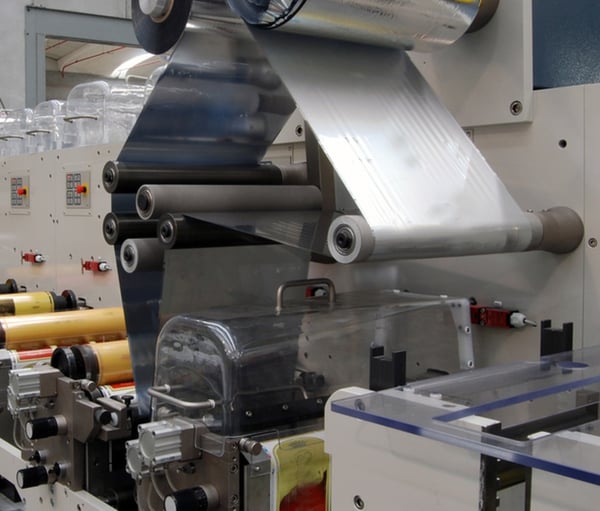Plastics do not conduct electricity on their own; they require special treatment. Otherwise, they are insulators. That means untreated plastics cannot discharge static buildup the way other materials can. Antistatic materials matter for electronics manufacturers, but they may also matter for manufacturers of food and any other product that uses plastic packaging.
Static buildup can cause a host of problems:
- Dust sticks to untreated plastic packaging, making the product unattractive.
- Dust buildup may contaminate the product when it is opened.
- Static may harm the electronics in flexible film packaging and filling machinery.
- Dust that sticks to plastics can work its way into machinery rollers, frames, and electronics components.
- Plastic film may not feed or seal properly if there is dust buildup.
- Static can spark, causing a fire or explosion if it contacts flammable materials.
- Combustible materials are not just chemicals; some food products can explode, especially if stored in metal drums with plastic liners.
You do not have to be an electronics manufacturer to need anti-stat film. If you are in the market, here are three things to consider.
Do You Need a Static-Free Environment?
You might not manufacture electronics, but you may have electronic components throughout the manufacturing and supply chain. Plastic film manufacturing and filling machinery, for example, has sophisticated electronics that control machine operation, collect data, and more.
Static can cause plastic film to stick to itself and everything else. It also attracts dust and does not let it go. Imagine plastic film feeding through your machinery and carrying dust on every turn of a roller. It does not take long for dust particles to make their way deep into costly machines, where they can affect operation and cause damage.
If your business or anyone else’s in the supply chain also manufactures, stores, or transports flammables, antistatic materials might be more important. Although antistatic garments help, humans carry electrical charges. Human contact with untreated plastics can exacerbate the static electricity problem.
Health and Safety Executive states these are just a few of the products that could catch fire or explode in the presence of static electricity:
- Cooking oils
- Custard powder
- Instant coffee
- Potato powder
- Sugar
- Flour
- Dehydrated milk
- Many other powdered foods
What Type of Antistatic Packaging Works Best for You?
Antistatic materials come in a few different types. Some are simple in function and good for basic static protection. There are also treated plastic films that shield against static and those that resist isolated static charges.
- Static-dissipative: Available in bags and tubes, these provide economical static dissipation protection. Special humectant additives can also create a shield around the packaging.
- Static-shielding: Also available in bags and tubes, these plastics are usually multi-layered and either metallic or semitransparent. They block electrostatic fields.
- Black conductive tubing: The third option in single-layer tubes or flat bags, this protects against static charges.
 Static can affect expensive machinery, causing mechanical and electronic malfunctions.
Static can affect expensive machinery, causing mechanical and electronic malfunctions.
Which Can You Find the Right Level of Static Protection?
Drums and pails are some of the most common packaging and storage options in food manufacturing. When you combine a plastic drum with a plastic liner, you have two components that are not conductive, making them a static spark hazard. Military or “mil-spec" and National Fire Protection Association (NFPA) standards are available in drum and pail liners.
Watch this quick video to see how CDF Corporation liners work.
CDF Corporation offers antistatic materials up to the highest military specifications.
- MIL-B-81705C standards: the highest static decay and surface resistivity
- NFPA-99: meets static decay time of .50 seconds or less at 50% +/- 2% relative humidity at a temperature of 23+/- 1°C./p>
- Conductive liners: carbon-loaded polyethylene that meets MIL-P-82646A, MIL-P-82647 and NFPA-56A specs.
Antistatic packaging materials are well known in electronics manufacturing, but food manufacturing may also need it. Specially treated plastics can shield against static charges and dissipate them, keeping the products, people, and manufacturing equipment safer from contamination, fire, and explosion.
If your food manufacturing business needs the best antistatic materials available, CDF Corporation can help. Download our corporate brochure to learn more about our products and services.


